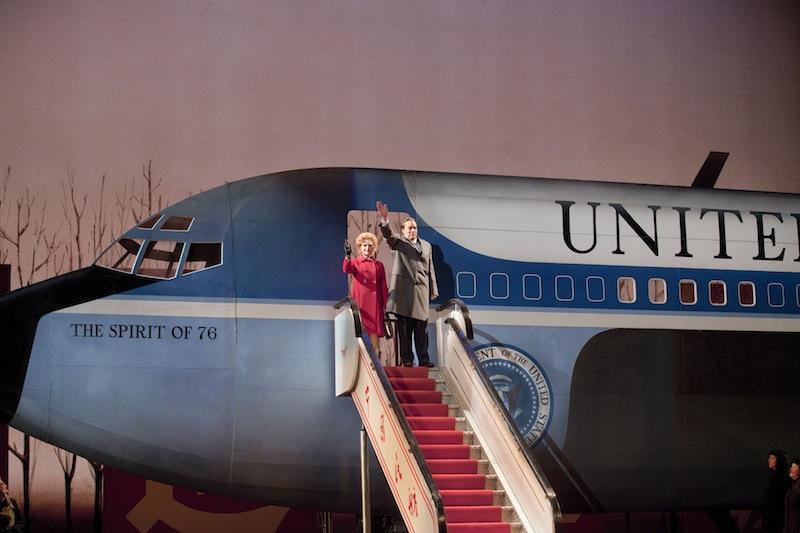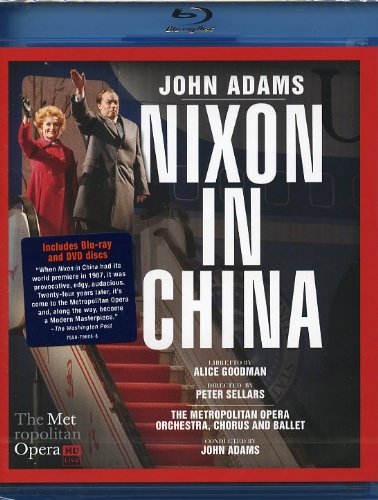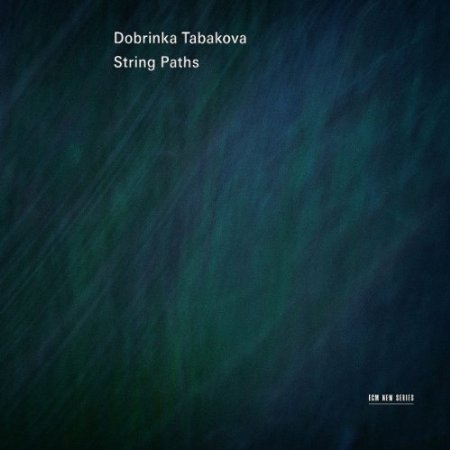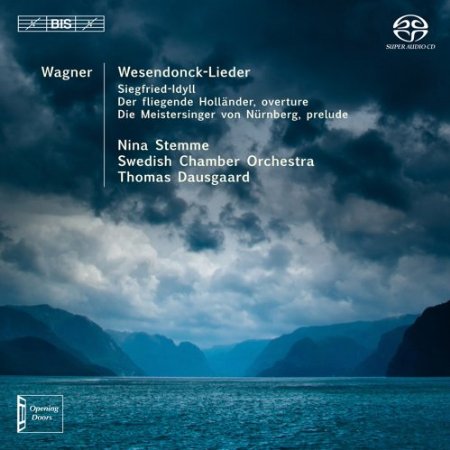Classical CDs Weekly: John Adams, Dobrinka Tabakova, Wagner | reviews, news & interviews
Classical CDs Weekly: John Adams, Dobrinka Tabakova, Wagner
Classical CDs Weekly: John Adams, Dobrinka Tabakova, Wagner
A classic among modern operas, contemporary music from Bulgaria and some slimmed-down Wagner


If, like me, you prefer your opera recordings to be heard and not seen, make an exception for this DVD of Peter Sellars’s remarkably lucid staging of John Adams’s Nixon in China. A work which, as David Nice pointed out when watching the live relay of this production, is probably the only opera composed since Britten’s death to gain a secure place in the repertoire. It’s hard to imagine the piece looking better, the vast Met stage perfectly suited to the work’s quasi-Wagnerian grandeur. It sounds terrific too. A beaming Adams conducts, the players sharing his delight in what remains his most melodically generous score. The faster, more stereotypically minimalist passages chug along as you’d expect, but Adams’s real skill lies in his ability to mould huge paragraphs, which stealthily unfold like Bruckner slow movements. The brooding third act contains the opera’s deepest music.
This production is brilliantly cast – Janis Kelly’s weary Pat Nixon is a joy, never better than when she’s being shown the delights of Beijing at the start of Act 2. And James Maddelena may look a little old to be convincing as Nixon, but the voice is strong and the diction crystal clear. What a pleasure to watch an opera in English and never feel the need to switch on the subtitles. Robert Brubaker’s Mao convinces, and Richard Paul Fink’s Kissinger is a comedic pantomime villain. Be amazed at Adrianne Lobel’s spectacular sets, and marvel at how Sellars directs a drama which becomes far more intimate and introspective than you might expect. No complaints about picture quality – this package contains both Blu-ray and DVD, with the image on the latter format immaculate. The bonus features are generous too, particularly an interview with Sellars.
Watch John Adams and Peter Sellars discuss Nixon in China

“Dobrinka Tabakova’s music has a particularly 21st-century feel for its broad palette – its free mix of tonality and modality, of folk-music influence and the example of past masters.” ECM’s sleeve note is entirely accurate. We’re innately suspicious of contemporary music which is easy on the ear – as if there’s conflict between accessibility and compositional rigour. Tabakova was born in Bulgaria in 1980, moving to London to study in the early 1990s. Her aim is to write music “that grabs you and has something to say,” citing John Adams and Sofia Gubaidulina among her inspirations. And she’s brilliant at seizing your attention – the angular bass figurations which kick off the Concerto for Cello and Strings, or the accordion-like wheeziness which colours parts of the string trio Insight. The concerto’s last movement is stunning, the combination of vigour and ecstacy recalling Tippett.
Tabakova’s Suite in Old Style for viola and chamber orchestra won’t frighten anyone – an affectionate baroque pastiche which does plumb genuine depths. That it could have been composed at any point during the last century shouldn’t underplay its charms. More striking is a trio for violin, accordion and bass, and an ambitious string septet, Such different paths, dedicated to (and here recorded by) Dutch violinist Janine Jansen. Solo playing throughout is inspired, whether it’s from Maxim Rysanov on viola, Kristine Blaumane on cello, or violinist Roman Mints. ECM’s sound is, as usual, rich and detailed.
Wagner: Wesendonck-Lieder, Siegfried-Idyll etc Nina Stemme (soprano), Swedish Chamber Orchestra/Thomas Dausgaard (BIS)
Playing Wagner with an orchestra of 38? The Swedish Chamber Orchestra have already recorded Brahms, Bruckner and Tchaikovsky. Surprisingly, these performances don’t come across as anaemic, thanks to a very vivid, closely-miked recording. It’s as if you’re listening to a highly-accomplished pit orchestra. Particularly successful is the prelude to Die Meistersinger. Dausgaard zips through the piece in eight and a half minutes. And what can sound unbearably pompous and portentous becomes upbeat and joyous, reminding us that this is supposed to be a comic opera. Wagner’s famous stretch of three-part counterpoint bounces along with disarming grace and clarity. Similarly breezy is the overture to The Flying Dutchman, heard in the familiar revision with its soupy coda as well as the slightly terser original. There’s no excess fat, but no absence of drive or drama either.
Less contentious is an affectionate, flowing reading of the sublime Siegfried-Idyll – with a tiny, sparkling contribution from the principal trumpet. And soprano Nina Stemme’s rapt account of the Wesendonck-Lieder is among the best around. As a bonus, there’s the composer’s own arrangement for violin and orchestra of the closing song, Träume. It’s delicious. A Wagner disc which you’ll want to return to.
Explore topics
Share this article
Add comment
The future of Arts Journalism
You can stop theartsdesk.com closing!
We urgently need financing to survive. Our fundraising drive has thus far raised £49,000 but we need to reach £100,000 or we will be forced to close. Please contribute here: https://gofund.me/c3f6033d
And if you can forward this information to anyone who might assist, we’d be grateful.

Subscribe to theartsdesk.com
Thank you for continuing to read our work on theartsdesk.com. For unlimited access to every article in its entirety, including our archive of more than 15,000 pieces, we're asking for £5 per month or £40 per year. We feel it's a very good deal, and hope you do too.
To take a subscription now simply click here.
And if you're looking for that extra gift for a friend or family member, why not treat them to a theartsdesk.com gift subscription?
more Classical music
 BBC Proms: Ehnes, Sinfonia of London, Wilson review - aspects of love
Sensuous Ravel, and bittersweet Bernstein, on an amorous evening
BBC Proms: Ehnes, Sinfonia of London, Wilson review - aspects of love
Sensuous Ravel, and bittersweet Bernstein, on an amorous evening
 Presteigne Festival 2025 review - new music is centre stage in the Welsh Marches
Music by 30 living composers, with Eleanor Alberga topping the bill
Presteigne Festival 2025 review - new music is centre stage in the Welsh Marches
Music by 30 living composers, with Eleanor Alberga topping the bill
 Lammermuir Festival 2025 review - music with soul from the heart of East Lothian
Baroque splendour, and chamber-ensemble drama, amid history-haunted lands
Lammermuir Festival 2025 review - music with soul from the heart of East Lothian
Baroque splendour, and chamber-ensemble drama, amid history-haunted lands
 BBC Proms: Steinbacher, RPO, Petrenko / Sternath, BBCSO, Oramo review - double-bill mixed bag
Young pianist shines in Grieg but Bliss’s portentous cantata disappoints
BBC Proms: Steinbacher, RPO, Petrenko / Sternath, BBCSO, Oramo review - double-bill mixed bag
Young pianist shines in Grieg but Bliss’s portentous cantata disappoints
 theartsdesk at the Lahti Sibelius Festival - early epics by the Finnish master in context
Finnish heroes meet their Austro-German counterparts in breathtaking interpretations
theartsdesk at the Lahti Sibelius Festival - early epics by the Finnish master in context
Finnish heroes meet their Austro-German counterparts in breathtaking interpretations
 Classical CDs: Sleigh rides, pancakes and cigars
Two big boxes, plus new music for brass and a pair of clarinet concertos
Classical CDs: Sleigh rides, pancakes and cigars
Two big boxes, plus new music for brass and a pair of clarinet concertos
 Waley-Cohen, Manchester Camerata, Pether, Whitworth Art Gallery, Manchester review - premiere of no ordinary violin concerto
Images of maternal care inspired by Hepworth and played in a gallery setting
Waley-Cohen, Manchester Camerata, Pether, Whitworth Art Gallery, Manchester review - premiere of no ordinary violin concerto
Images of maternal care inspired by Hepworth and played in a gallery setting
 BBC Proms: Barruk, Norwegian Chamber Orchestra, Kuusisto review - vague incantations, precise laments
First-half mix of Sámi songs and string things falters, but Shostakovich scours the soul
BBC Proms: Barruk, Norwegian Chamber Orchestra, Kuusisto review - vague incantations, precise laments
First-half mix of Sámi songs and string things falters, but Shostakovich scours the soul
 BBC Proms: Alexander’s Feast, Irish Baroque Orchestra, Whelan review - rapturous Handel fills the space
Pure joy, with a touch of introspection, from a great ensemble and three superb soloists
BBC Proms: Alexander’s Feast, Irish Baroque Orchestra, Whelan review - rapturous Handel fills the space
Pure joy, with a touch of introspection, from a great ensemble and three superb soloists
 BBC Proms: Moore, LSO, Bancroft review - the freshness of morning wind and brass
English concert band music...and an outlier
BBC Proms: Moore, LSO, Bancroft review - the freshness of morning wind and brass
English concert band music...and an outlier
 Willis-Sørensen, Ukrainian Freedom Orchestra, Wilson, Cadogan Hall review - romantic resilience
Passion, and polish, from Kyiv's musical warriors
Willis-Sørensen, Ukrainian Freedom Orchestra, Wilson, Cadogan Hall review - romantic resilience
Passion, and polish, from Kyiv's musical warriors
 BBC Proms: Faust, Gewandhausorchester Leipzig, Nelsons review - grace, then grandeur
A great fiddler lightens a dense orchestral palette
BBC Proms: Faust, Gewandhausorchester Leipzig, Nelsons review - grace, then grandeur
A great fiddler lightens a dense orchestral palette


Comments
Now THERE's a perfect